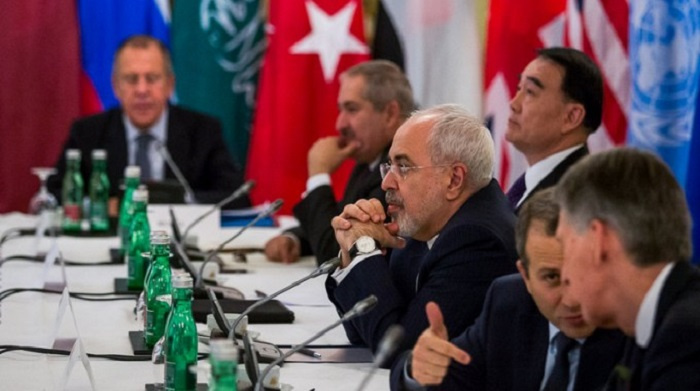The Multiple Significance of Vienna Meeting on Syria

Iran scored a major diplomatic gain by participating in the international gathering on Syria in Vienna and also by influencing the meeting's outcome. As a result, Iran's regional and international image has been improved, as a serious regional actor that wields considerable regional clout and is adept in international diplomacy, particularly when it comes to conflict-resolution.
The Vienna talks brought US and Iran around the table over a non-nuclear issue and, by all indications, the prior nuclear diplomacy that involved numerous interactions between US and Iranian top diplomats, is an important factor that shapes the perceptions and expectations of both sides in their common search for a political solution in Syria. After the meeting, US Secretary of State John Kerry and his Iranian counterpart Javad Zarif held a bilateral meeting on the issue of implementation of the recent nuclear agreement. US, Russia, and Iran have now called for a cease-fire in Syria, which in turn depends on the future of political dialogue between Damascus and the armed opposition.
According to the 9-point joint statement adopted at the conclusion of the Vienna talks on Syria, the UN is now shouldered with the responsibility of convening a peace talk between the Syrian government and the Syrian opposition "for a political process leading to credible, inclusive, non-sectarian governance, followed by a new constitution and elections." The joint statement also calls for the preservation of Syrian independence, sovereignty and "state institutions."
The big question is, however, if the Syrian state institutions will hold together or rather disintegrate when and if the current president Bashar al-Assad steps down? There are, after all, certain striking resemblances to Libya under Gaddafi, which in turn raises the specter of 'Libyaization" of post-Assad Syria, which is already deeply fragmented. The hoped-for objective of national unity in Syria can prove highly elusive if the necessary preconditions -- that would prevent the repetition of Libya's post-Gaddafi nightmare -- are not in place. Unlike Libya, today's Syrian government enjoys the solid backing of two power houses, namely Iran and Russia, that underwrite its longevity. Consequently, irrespective of the de facto break-up of Syria into government, rebel, and terrorist-held territories, there is no imminent danger of collapse of central government in Damascus and, in fact, the latter's military forces have benefited from the current Russian military intervention by launching new ground offensives to regain the lost territories, with partial success so far.
There is, however, no military solution in Syria, in light of the increased US aid to the Syrian rebels and dispatch of special forces ostensibly to fight the ISIS, and short of a political resolution, the Syrian quagmire will likely continue, with disastrous results for the Syrian people, so many of whom are turned into war refugees fleeing their homes, thus forming one of the world's worst humanitarian crises. An important prerequisite for ending this quagmire is, of course, defeating the foreign terrorists who have flocked to ISIS's side inside both Iraq and Syria, which is why the Vienna meeting's statement on the need to defeat ISIS is so important.
At the same time, the complex regional and extra-regional dimensions or root causes of conflict in Syria must be properly identified and tackled, such as the sectarian divide and the Iran-Saudi rivalry, which altogether do not lend themselves to simplistic or quick resolutions, which is precisely why the Vienna meeting's presence of Iranian and Saudi diplomats at the table was a major step forward. The 19-nation group has scheduled to reconvene in November, thus underscoring the role of sustained diplomatic efforts to tackle the "wide gaps" between the participants' views, to paraphrase Iran's Deputy Foreign Minister, Hossein Amir-Abdollahian.
According to various Iranian foreign policy experts, the two issues of Assad's fate and the nature and composition of the Syrian opposition formed two 'blind knots' of the Vienna talks. Concerning the former, Iran has taken credit for disallowing any reference to Assad's departure in the meeting's joint statement, yet there is a growing consensus that at some point in the future Mr. Assad must step down for the sake of a new government of national unity. The Saudi Foreign Minister has followed the Vienna meeting with adamant calls for a timetable for Assad's departure, which cannot be considered acceptable to either Russia or Iran so long as the important prerequisites for avoiding a post-Assad regime collapse are not fully in place. There are, after all, plenty of examples of international agreements on political transitions, e.g., in Ukraine, that fizzled by the sheer dynamism of political processes, which serve as important historical lessons on Syria.
Henceforth, political and diplomatic dialogue between Damascus and the Syrian opposition must go hand in hand with inter-regional dialogue, e.g., between Tehran and Riyadh, two regional pillars who can utilize the opportunity afforded by the Syria talks to improve the climate between them. Without doubt, this is an important prerequisite for a timely exit from the Syrian crisis, plaguing the region and, indeed, the whole world.

